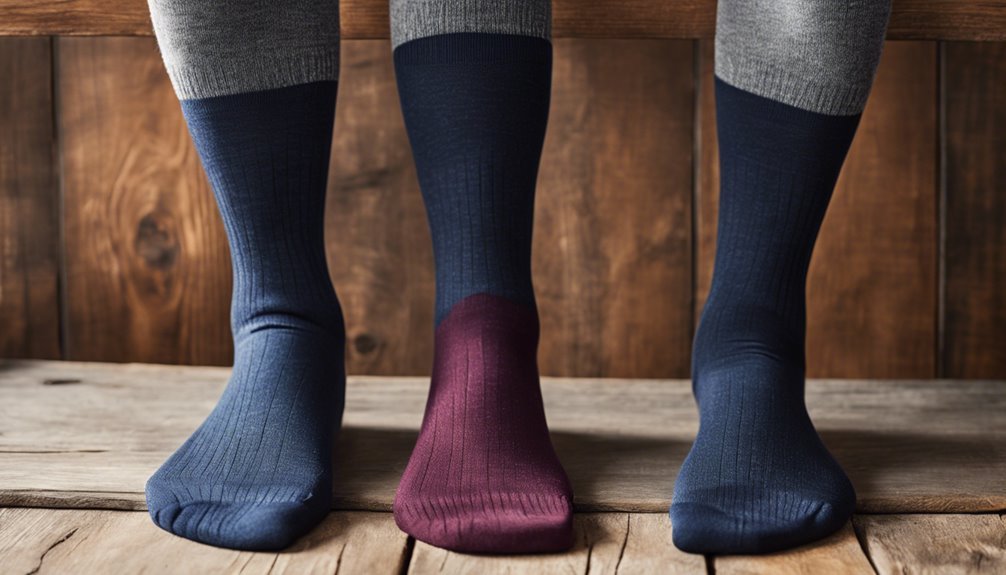Cold-Weather Work Socks vs. All-Season Work Socks: Which Is Worth Buying?
When choosing between cold-weather work socks and all-season work socks, consider your specific needs. Cold-weather socks excel in insulation, trapping heat and wicking moisture to keep your feet warm in frigid conditions. Conversely, all-season socks offer versatility, adapting to varying climates with breathability and cushioning. If you work primarily in cold settings, opt for dedicated cold-weather socks. For year-round tasks, all-season options provide comfort in different temperatures. Discover which sock is right for your activities next.
Understanding Cold-Weather Work Socks

When temperatures drop, having the right gear is essential, and that's where cold-weather work socks come into play. These socks are specially designed to provide superior thermal insulation, keeping your feet warm when you're working outdoors. Unlike all-season socks, cold-weather options feature materials that trap heat, ensuring your comfort during frigid conditions.
Moisture management is another critical aspect. Cold-weather work socks wick sweat away from your skin, preventing dampness that can lead to chilling and discomfort. Look for socks made from merino wool or synthetic blends, as they effectively balance warmth and breathability. By investing in quality cold-weather work socks, you'll enhance your overall comfort and performance, allowing you to focus on the task at hand without worrying about cold or wet feet.
Benefits of Cold-Weather Work Socks
Cold-weather work socks offer numerous advantages that can greatly enhance your outdoor work experience. One of the key benefits is heat retention; these socks are designed to keep your feet warm even in frigid temperatures. This is vital when you're working for extended periods, as cold feet can lead to decreased productivity and discomfort. Additionally, effective moisture management is another important feature. Cold-weather socks wick away sweat, preventing the dampness that can cause chilling and blisters. With the right pair, you can enjoy both warmth and dryness, allowing you to focus on the task at hand without the distraction of cold, wet feet. Investing in quality cold-weather work socks is essential for maintaining comfort and efficiency in harsh conditions.
Exploring All-Season Work Socks
While many workers rely on specialized cold-weather socks, all-season work socks are designed to adapt to a variety of conditions, providing versatility for those who may encounter fluctuating temperatures. Choosing the right pair means considering key factors such as:
- Material Types: Look for blends like merino wool, synthetic fibers, or cotton, as they balance warmth, breathability, and moisture-wicking properties.
- Cushioning Levels: Depending on your activity, opt for light, medium, or heavy cushioning to enhance comfort without sacrificing performance.
- Fit and Height: Guarantee a snug fit and choose the right height (crew, knee-high) to provide support and protection based on your work environment.
Investing in quality all-season work socks can keep your feet comfortable, no matter the weather conditions you face.
Advantages of All-Season Work Socks

All-season work socks offer numerous advantages that make them a smart choice for many workers. They're designed to keep your feet comfortable in varying conditions, thanks to breathable materials that promote airflow. This is especially important if you're on your feet all day. Additionally, moisture wicking technology helps to draw sweat away from your skin, keeping your feet dry and reducing the risk of blisters or odors. Here's a quick comparison of key advantages:
| Advantages | Description |
|---|---|
| Breathability | Enhances airflow to keep feet cool |
| Moisture Wicking | Draws sweat away for dryness |
| Versatility | Suitable for different weather conditions |
| Comfort | Cushioned support for all-day wear |
| Durability | Long-lasting materials withstand wear |
Choosing all-season work socks can truly elevate your comfort and performance.
Factors to Consider When Choosing Socks
When selecting the right socks for your work environment, you'll want to contemplate several key factors that can greatly impact your comfort and performance. Here are three essential considerations:
- Sock Materials: Choose materials like merino wool or synthetic blends for moisture-wicking properties and durability.
- Temperature Regulation: Ascertain your socks provide insulation in cold conditions while allowing breathability in warmer settings.
- Fit and Thickness: Opt for socks that fit snugly but aren't too tight, and consider thickness based on your footwear and the conditions you'll face.
Making the Right Choice for Your Needs
Choosing the right socks tailored to your specific work environment can greatly enhance your comfort and productivity. Consider the sock materials; merino wool is excellent for cold-weather, providing warmth and moisture-wicking properties, while synthetic blends may offer better durability for all-season use. If you're working in fluctuating temperatures, opt for socks with effective temperature regulation features that adapt to your body heat, keeping your feet comfortable regardless of conditions. Think about your daily activities too; heavy-duty cushioning is beneficial for long hours on your feet, while lighter options might suit less demanding tasks. Ultimately, understanding your environment and needs will guide you toward the best choice, ensuring you stay comfortable and focused on the job.
Frequently Asked Questions
Can I Wear Cold-Weather Socks in Warmer Months?
Sure, you can wear cold-weather socks in warmer months, but they might not provide the necessary sock breathability or temperature regulation. Consider lighter options for comfort to keep your feet free and fresh.
How Do I Properly Care for My Work Socks?
To care for your work socks, use gentle sock washing techniques like cold water and mild detergent. For drying, avoid high heat; instead, air dry or use low heat to maintain their shape and durability.
What Materials Are Best for Cold-Weather Socks?
When choosing materials for cold-weather socks, opt for wool. Its insulation and moisture management properties keep your feet warm and dry, allowing you to focus on your tasks without discomfort. Comfort's key to freedom!
Are There Any Specific Brands Recommended for Work Socks?
When choosing work socks, consider brands like Carhartt and Darn Tough for their durability. Brand comparisons show that investing in quality guarantees comfort and longevity, making your work experience more enjoyable and efficient.
How Often Should I Replace My Work Socks?
Think of your work socks as trusty companions. To maintain peak sock performance, replace them every 6-12 months, depending on use. This keeps them fresh and guarantees a longer sock lifespan for your feet's comfort.







